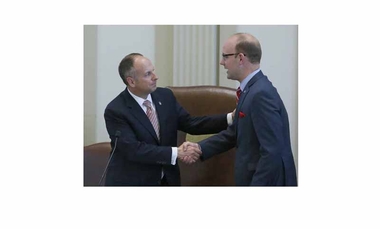Oklahoma Legislature closes $1.3B gap, finishes 2016 session

OKLAHOMA CITY (AP) — Facing a historic $1.3 billion hole in the budget at the start of the year, the state Legislature managed to close the gap through a combination of agency cuts, tax credit reforms, fee increases and the use of one-time funding sources, including bonds.
But many characterized the 2016 legislative session that ended last week as one where Republican leaders failed to capitalize on an opportunity to bring in significant new revenue or make structural changes to how the state finances its operations.
___
OKLAHOMA'S BUDGET:
Plummeting oil and gas prices, exacerbated by years of tax cuts and generous corporate subsidies, shriveled state revenue collections and forced two separate, across-the-board cuts to state agency budgets totaling about 7 percent just as the legislative session began.
The final $6.8 billion spending plan, which didn't emerge until the final week of session, covered roughly $970 million of a $1.3 billion projected budget shortfall for the next fiscal year, which begins July 1. As a result, state agencies must absorb about $360 million in cuts from last year's appropriation. The rest of the deficit was covered through a variety of revenue options, including a $200 million transportation bond issue, tapping road and bridge funds for another $103 million, and using about $144 million from the state's Rainy Day Fund, leaving the state's emergency fund with a balance of about $241 million.
Leaders in the GOP-controlled Legislature said overall they were pleased with a final budget that shielded K-12 schools and the state's health care system from further cuts, while Democrats decried it as woefully underfunding core services, especially higher education and social services.
___
MISSED REVENUE ENHANCEMENTS:
A number of bold revenue-enhancing initiatives were floated and discussed during the session, many of them percolating from working groups formed in the House. Among the ideas were a fuel tax to fund roads and bridges, a cigarette tax to pay for health care, an expansion of health insurance to tens of thousands of uninsured working Oklahomans, and the broadening of the sales tax to fund pay raises for teachers or slash the tax on groceries. But none of the ideas got off the ground.
The only proposal that actually made it to the House floor for a vote was the $1.50-per-pack cigarette tax, but Democrats in the 101-member House flexed their political muscle and locked up their 30 votes, demanding that in exchange the GOP-led Legislature embrace a Medicaid expansion. In the end, neither proposal made it anywhere.
A Senate-backed attempt to scale back a generous tax subsidy for the wind industry also stalled in the House.
Among the revenue enhancements that were enacted include a cap on a tax credit for marginally producing oil wells, an adjustment to the earned income tax credit for the working poor, and a requirement that Oklahoma motorists buy new license plates.
___
MEDICAID 'REBALANCING':
Because Republicans in Oklahoma so fiercely rejected anything connected to the federal Affordable Care Act, a straight expansion of Medicaid has been politically impossible, so the head of the state's Medicaid agency had to get creative. Oklahoma Health Care Authority Chief Executive Officer Nico Gomez came up with the "Medicaid Rebalancing Act," which would have expanded Medicaid eligibility to those earning up to 138 percent of the poverty level and provided health coverage to an estimated 170,000 uninsured Oklahomans. To do it would have required shifting roughly an equal number of currently Medicaid-eligible pregnant women and children into the private market, where they would receive federal tax subsidies to help them buy policies.
But the Medicaid proposal fizzled in the Senate, especially amid growing opposition from free-market think-tanks and conservative icon former U.S. Sen. Tom Coburn.
"I think we've been consistent since Day One that we didn't want to expand the Obamacare," said Senate President Pro Tem Brian Bingman. "It's not sustainable. The state can't afford it."
That position drew a sharp rebuke from Democrats who have pushed to expand Medicaid, which would infuse hundreds of millions of dollars of federal money into the state's health care system.
"For the last six years, Republicans have fought against Medicaid expansion without offering a viable solution," said Senate Democratic Leader John Sparks, D-Norman. "Blaming President Obama for a system which is working in other states is no substitute for leadership."
___
SOCIAL ISSUES:
The session also came to a close with a last-minute flurry of legislation targeting hot-button social issues, including abortion and the use of bathrooms by transgender people, that exposed a rift within the Republican caucuses in the House and Senate. A bill that would have made it a felony for a doctor to perform an abortion in Oklahoma passed the Legislature, but was vetoed by Republican Gov. Mary Fallin, a strong abortion opponent who said the law was vague and unconstitutional.
A transgender bathroom bill that would have required schools to provide separate restrooms for students who didn't want to share them with transgender students died in a Republican-led committee on a 10-10 vote. The failure of both measures rankled the right wing of the House and Senate GOP caucuses.
Copyright 2016 The Associated Press. All rights reserved. This material may not be published, broadcast, rewritten or redistributed.
The Gayly - 5/28/2016 @ 10:39 a.m. CDT





